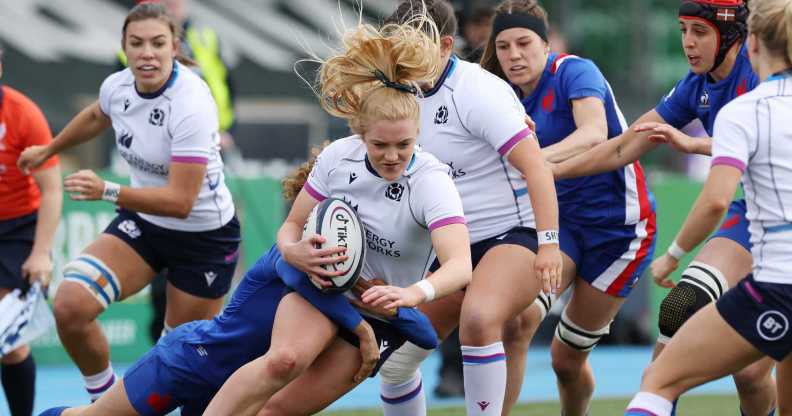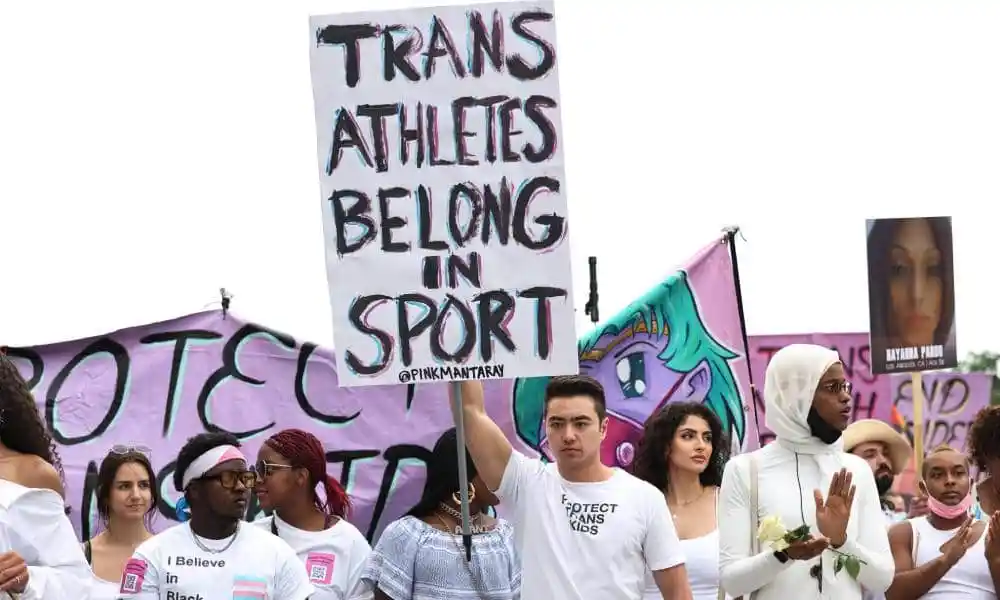Scottish Rugby sparks backlash after banning trans women from contact rugby: ‘This is wrong’

Megan Gaffney of Scotland is tackled by Marie-Aurelie Castel of France during the Scotland and France Women’s Six Nations matc at Scotstoun Stadium on April 10, 2022 in Glasgow, Scotland. (Ian MacNicol/Getty Images)
The Scottish Rugby Union has announced a ban on trans women playing as part of women’s contact rugby teams, but insists “inclusion is a bedrock” of the game.
The updated gender participation policy will be applied from 1 February and means contact rugby for players in the women’s category will be limited to those “whose sex was recorded as female at birth”.
Previously trans women could participate in the women’s game in Scotland dependent on the outcome of a medical process, which included testosterone tests.
Trans men are still free to continue to play contact rugby in the men’s category once a “risk assessment” has been carried out.
A spokesperson for the Scottish Rugby Board said: “We fully acknowledge this is a difficult and sadly divisive societal issue, and that has been especially apparent over the last few months.
“Scottish Rugby has been mindful of this and aimed to deal with the issue in a sensitive manner.”
The update to the policy comes as Scottish Rugby’s club members begin to prepare for the women’s Cup Competition.
“Inclusion is a bedrock of our sport,” the statement continues.
“Scottish Rugby wishes to be as inclusive as possible and is only imposing such eligibility restrictions based on the guidance provided.
“The decision to amend our eligibility criteria was not taken lightly as we seek to address conflicting viewpoints,” the spokesperson added.
Scottish Rugby claim the updated policy puts “safety first, based on current research”, and say it is now in line with World Rugby’s transgender policy and the guidelines produced by the UK Sports Councils’ Equality Group.

A spokesperson for Scotland’s inclusive rugby team, Caledonian Thebans RFC, told PinkNews: “We oppose the decision made by Scottish Rugby. We believe that trans players have a valued place in our rugby community.
“Trans women deserve a place in rugby union where they can play as themselves with pride and support.”
They continued: “Caledonian Thebans RFC will continue to be a club that proudly welcomes all players. Celebrating everyone within the LGBTQIA+ community.
“We welcome Scottish Rugby’s commitment to review this policy on an annual basis. We will continue to work with them and hold them to account on this.”
According to Scottish Rugby the policy will be reviewed on an annual basis.
‘Restricting who can play rugby is the wrong choice’
The Caledonian Thebans said they hope progress will be made to “make rugby a better and more inclusive game”.
“In a world where rugby is looking to grow. Restricting who can play is the wrong choice. Inclusive rugby is the path to growing grassroots rugby,” the spokesperson added.
A spokesperson for trans charity, Gendered Intelligence, told PinkNews the banning of trans women is “disheartening”.
“Despite all the talk of safety and fairness, there is no evidence that the participation of trans women – who make up a vanishingly small minority of competitive athletes – has had any prior negative impact on competitive play or on player safety.”
‘Everyone deserves a chance to take part’
The Gendered Intelligence spokesperson continued: “We’re especially concerned for the future of grassroots sport. Trans people have significantly worse access to sport and physical activity.
“If sporting bodies continue to bow to political pressure we fear that the exclusion of trans people – particularly trans women – will expand beyond high-level competition to youth activities and casual play.
“Everyone deserves a chance to take part. Nobody should be barred from sport because of who they are.”

Several sports have banned trans women from participating, despite scientists stating there’s no real reason to blanket ban trans athletes from sports.
Many who rally to ban trans athletes claim gender is defined by biological sex. But scientists have long said that biological sex isn’t so straightforward and there is no single biological factor that defines a person’s sex.
“A person’s genetic make-up and internal and external reproductive anatomy are not useful indicators of athletic performance,” said Dr Joshua Safer.
“There is no inherent reason why her physiological characteristics related to athletic performance should be treated differently from the physiological characteristics of a non-transgender woman.”
In 2020, World Rugby published guidelines that trans women should be banned from women’s rugby union.
At the time, trans rugby player Verity Smith hit out at the ban, saying the policy is about “policing women’s bodies”.
Elite swimming’s governing body FINA also voted to effectively ban trans women from competing in women’s elite races, stating it will instead create a separate “open category”.
In July last year, British Triathlon banned trans athletes from competing in the female category at an elite and grassroots level, creating a new “open category”.
The Rugby Football Union also banned female trans athletes from taking part in the women’s category, citing “fair competition and safety”, while Volleyball England followed suit.
Worryingly, World Athletics and FIFA have also hinted at banning trans athletes.

